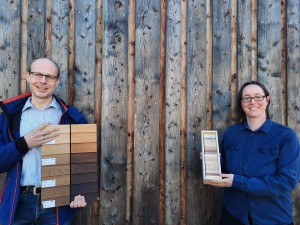Predictability of color changes of wood used indoor - A new approach to evaluate the color change as a function of the radiation dose

Project description
The optical properties of wood show a high variety and depend on the chromophoric functional groups and chromophore systems present in the wood. Noticeable color variations are found both between different species as well as within a wood species. During natural aging, wood undergoes a color change, which is mainly caused by radiation of ultraviolet and visible light and the hereby induced photo-oxidation. The aim of this project is to convert key figures into a databased modelling in order to be able to evaluate the chemical and color changes of wood based on the radiation dose. This includes the evaluation of the changes via depth profiles.
Overall, research problems are dealt with on the basis of the following hypotheses:
- Color and chemical changes in wood during natural sunlight exposure indoors (t_n) and during artificially simulated UV/Vis exposure indoors (t_a) are known:
a) If there are species-specific relationships between the two exposures, these can be described mathematically using a compensation curve. The parameters can be calculated using the generalized least squares estimation method. For the assumed relationship t_n = z * t_a, the shift factors (z) can then be determined.
b) When light-induced color and chemical changes occur, these can be checked for correlations using a structure-discovering method from explorative data analysis and multivariate statistics (principal component analysis, PCA).
c) If the irradiation exposures have short-term color and chemical effects, then long-term changes can be deduced via linear regressions.
- If the sunlight exposure can be specified as a function of time, then it can also be specified as a function of radiation dose (accumulated area-based power density).
- UV/Vis light filtered through window glass penetrates various types of wood at different depths: The further away the effect of surface-based radiation is from the wood surface, the lower the color and chemical changes. If the changes are attenuated with increasing penetration depth, this results in depth profiles in the wood substance that can be measured color-wise and chemically.
- If the evaluation of the planned measurements as a function of radiation dose, rather than as a function of time, produces revealing findings, then changes can be predicted.
- If new findings emerge from the preceding research hypotheses, then these must urgently be taken into account in material tests that are to be developed and tailored to the material wood.
Research project partners
PD Dr. habil. Gerald Koch - as co-responsible; Thünen Institute, Institute of Wood Research, Hamburg-Bergedorf (TI-HF)
Prof. Dr. habil. Mario Beyer - as cooperation partner; Institute for Wood Technology Dresden gGmbH (IHD)
Funding
Head of project and contact person
Equipment financed from the project
- Sunlight simulation device from Q-Lab: Q-SUN Xe-3-H Xenon Test Chamber
Pyranometer from OTT HydroMet: Tilt & Zones SMP11 with Irradiance display and data logger METEON 2.0
Publications
Conference-Contribution
Lenz C, Gollee P, Kühn M, Leich C, Pfriem A. (2023) [extended abstract] | Artificial irradiation (indoors) of European wood species at different irradiation intensities and at different temperatures. In: Proceedings of the 19th Meeting of the Northern European Network for Wood Science and Engineering (WSE), 10-12 October 2023, Ås/Oslo, Norway (ed.: E. Larnøy), pp: 125-127 DOI: 10.57741/opus4-765 |
Data Management Plan (DMP)
| Lenz C, Wolff I, Beyer M, Koch G, Pfriem, A. (2023) | DMP: Predictability of color changes of wood used indoor - A new approach to evaluate the colour change as a function of the radiation dose. Research Data Management Questionnaire. Zenodo. |
Conference Poster
| Wolff I, Lenz C, Panitz M, Pfriem A. (2023) | Chart for the Core Objectives of Data Publishing within Technical Infrastructure for Research Data Management. National Research Data Infrastructure for Engineering Sciences (NFDI4Ing) Conference 2023 - Innovation in Research Data Management: Bridging the gaps between disciplines and opening new perspectives for research in engineering science, 27-28 September 2023, online |













